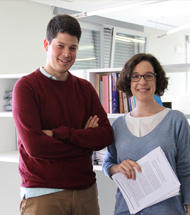The last months of the doctoral thesis
At the gates of depositing their research, ICS doctoral students Sergio Clavero and Adriana Gordejuela take stock of the four years they have dedicated to it, a period of tenacity, resilience and discoveries from which they take much more than a degree scroll

PHOTO: Isabel Solana
Sergio Clavero and Adriana Gordejuela have approached the new academic year with great expectation and a bit of vertigo. No wonder: before the end of the year they will defend their thesis . The Institute for Culture and Society (ICS), where they have learned how to start a researcher degree program , has witnessed during the last four years their first achievements and also moments of doubt and blockage. Their testimonies coincide in that the degree scroll will be the most awaited gratification, but not the only reward they take from this stage.
"I like to know," Sergio argues about his decision to do the doctorate. After the licentiate degree at Philosophy he did the Master's Degree at the University and thought that making his way into a topic at the framework of this discipline was the natural next step.
He decided to continue along the lines of his work fin de Master's Degree, related to John Elster 's proposal on ends and means, and that led him to the opposite position held by another current thinker, Axel Honneth, and the relationship between bonds, identity and normativity to analyze today's society.
Adriana also began to think about the idea of thesis as she finished degree program. "From the beginning I wanted to do something related to the "language" of cinema, and my director, Inés Olza, was the one who showed me a whole panorama of research that I didn't know about," she says.
He adds that, after considering different options, they chose the flashback as the object of study "because it is a narrative resource well established in cinema, but at the same time it leaves a lot of room for stylistic creativity". Specifically, he wonders about "the common denominator to all flashbacks (in cognitive terms) that allows them to be properly understood by the viewer".
The beginning of the degree program researchCentering the topic is, from agreement with Sergio, one of the main difficulties faced by all PhD student: "As you read bibliography you discover secondary branches. You can block yourself if you want to cover them all. Your aspiration should be to make a rigorous work and enter into dialogue with different authors, but aware that you may open topics that you cannot close". And he insists that the thesis "is the beginning of a research degree program , not its culmination. If you think you have to close everything, you can panic.
He attests that the decision on "where to stop" is always complex because you have to realize when and where to do it. "As you go along you realize there are a lot of things you don't know and as the defense date approaches you want to go over more things in the chapters, but you need to put a period, although always as rigorously as you can," he advises.
He recognizes that in addition to the balance between self-demand and patience, doctorate has taught him a lot about his performance and his rhythms, which he has realized are different in each researcher. In addition, he has experienced in his own skin what it takes to write a handful of good pages and that has made him value more his work and that of his colleagues. "All this makes you financial aid to grow," he says.
She agrees with Adriana that in the hardest moments the support of director from thesis is fundamental. She emphasizes that hers, Inés Olza, "without ceasing to be demanding, has always been a motivating source " and has been able to "transmit a lot of peace". This was especially important at times when she felt that the task was "too big for her" and she was assailed by the doubts of the so-called impostor syndrome: "You think you know absolutely nothing, that you are not up to the topic, the thesis , what is being asked of you, etc.".
A path to discoverSharing moments with other doctoral students and listening to the experience of the directors of thesis and that of other researchers always financial aid, of course, but Adriana emphasizes that "some things are only learned the hard way, through experience. The path of thesis is traveled by each one and in that process one also learns a lot about oneself and about things that go beyond the work of research that one is doing". He says that to the Adriana of 2014 he would give some basic advice on methods of work or management of time, "but without spoilers: there are things that it is better to discover along the way".
Hours of Library Services, countless articles and monographs read, stays abroad -Sergio at the Catholic University of the Sacred Heart, in Milan, and Adriana at the University of California-Los Angeles (USA), hundreds of paragraphs written and revised over and over again... There have been many milestones, but everything becomes more frenetic in the final stretch, where the main challenge is to meet the deadlines to deposit the thesis and defend it before the end of 2018.
"Finishing it is a mixture of feelings," Sergio reflects. "On the one hand, you want to finish now to see the tangible fruit of your work, but it has been a very nice time and it's also sad to see it end," he says. "I consider it a privilege to be able to dedicate a few years completely to a topic that you like and that serves you as a person. I've gained something from this that I wouldn't have gotten otherwise."
